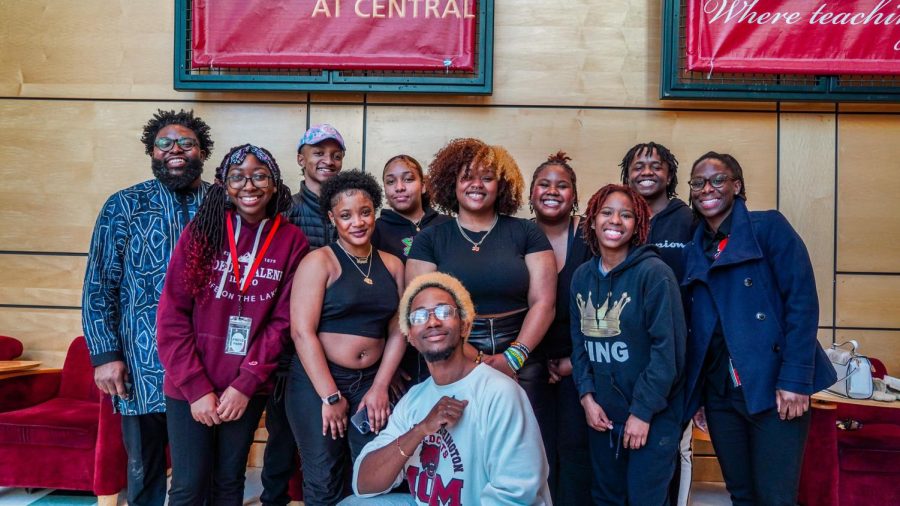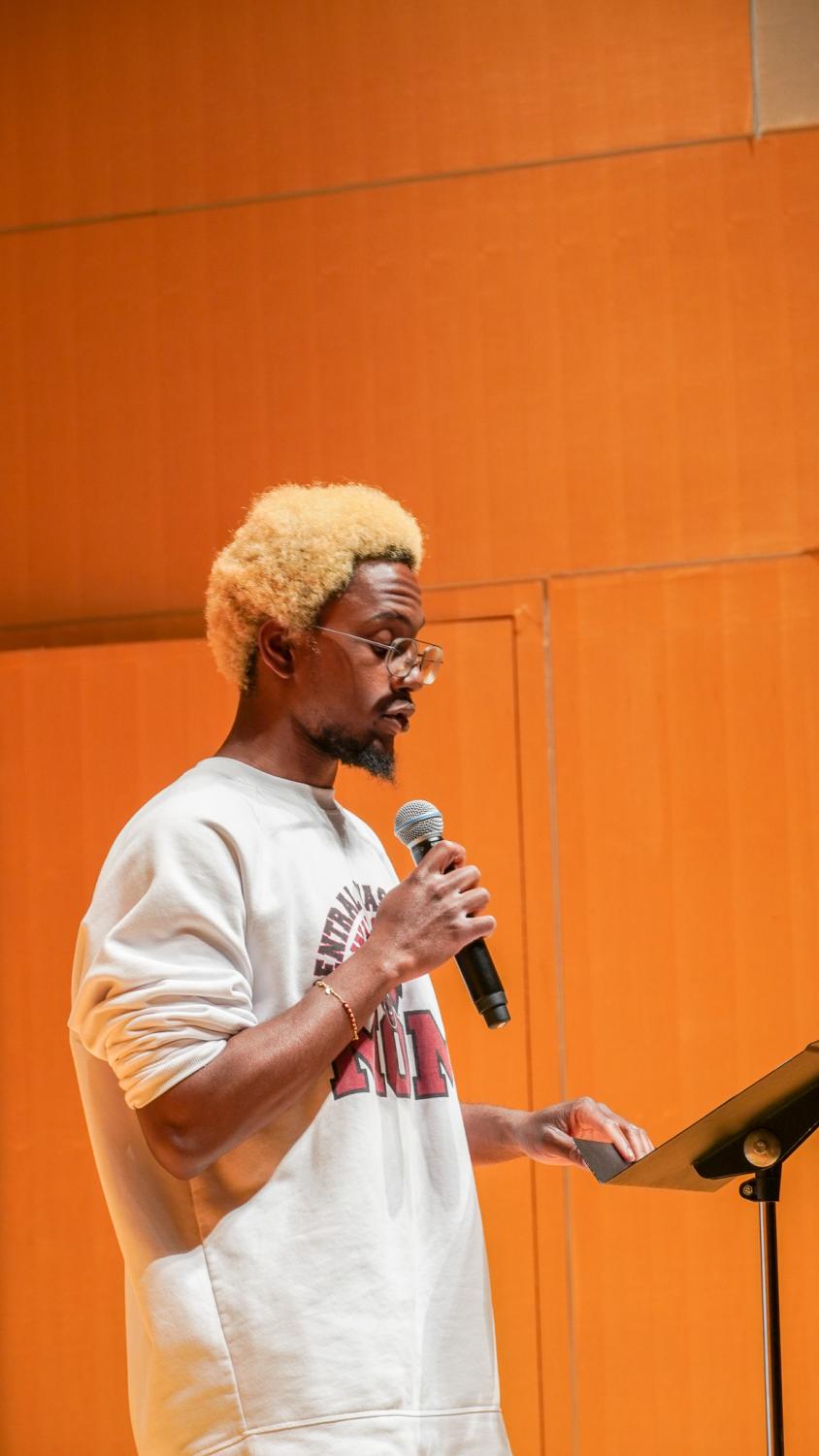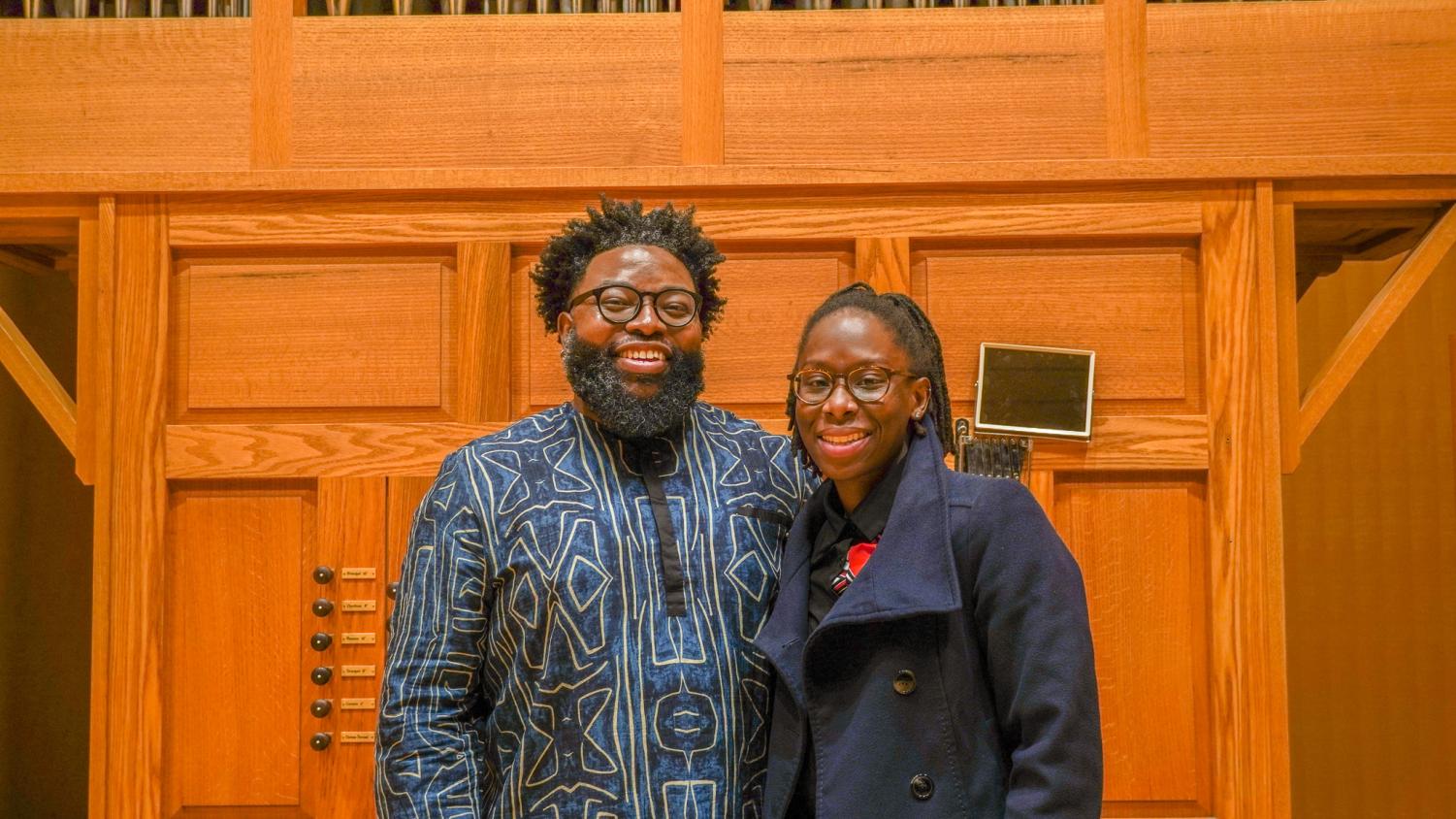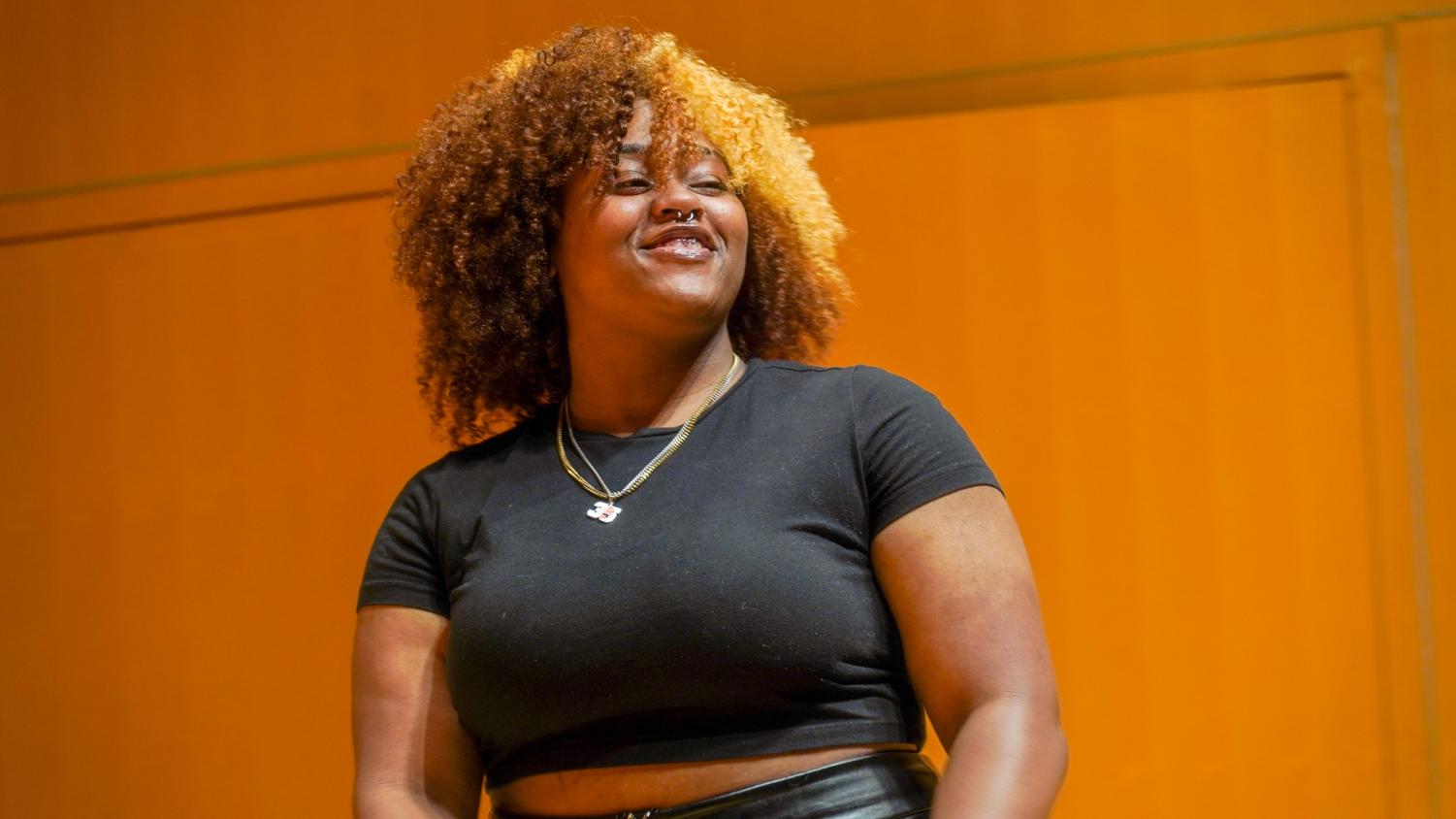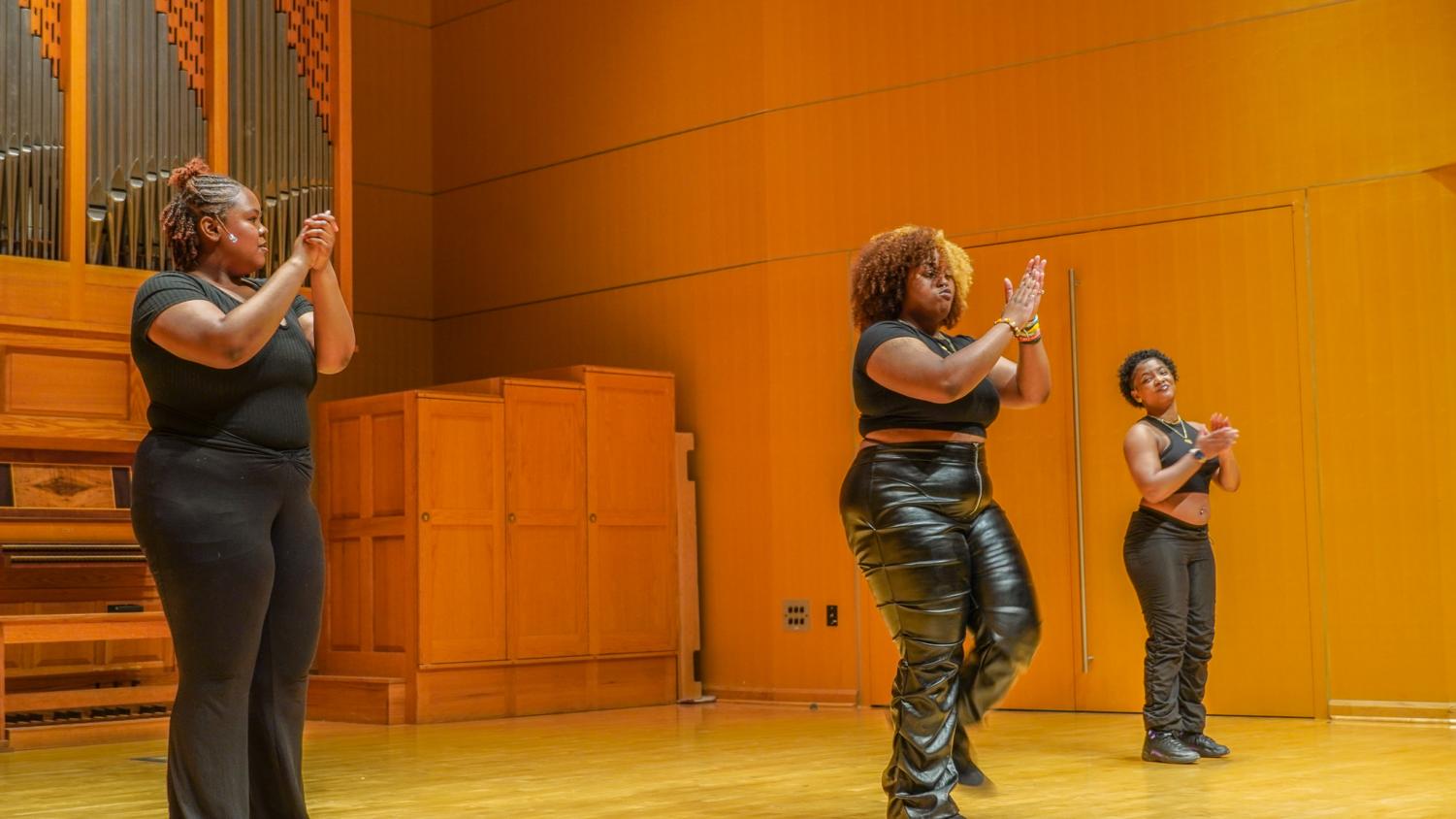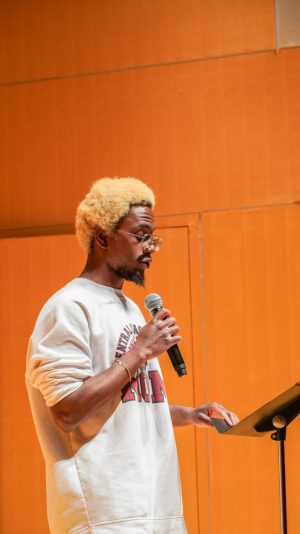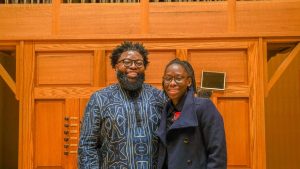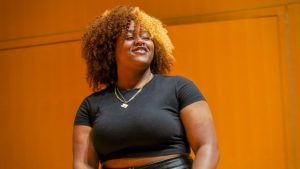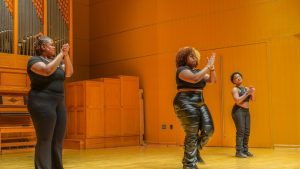CWU’s first-ever Black history and culture musical event celebrates “the bedrock of American music”
Dr. Tarver (far left) and Dr. Wheeler (far right) with performers and audience members
May 10, 2023
Drill step, thought-provoking poetry and soaring operatic vocals were a few of the many highlights of CWU’s first ever Black history and culture musical celebration, held in McIntyre Recital Hall on May 1.
Under the leadership of Associate Professor of Saxophone Dr. Kendra Wheeler, students of the saxophone studio organized the event in collaboration with other disciplines in the department as a post celebration of Black history month, traditionally celebrated in February.
“Black people everywhere are Black every day, all day of the year, but history and culture can always be celebrated and can always be appreciated,” Wheeler said. “It’s great that we have that history month, but when we’re talking about a rich history and culture of people and peoples, it is important that they are recognized more than just one time a year.”
Thunderous applause and ringing cheers were abundant at the recital hall after each performer demonstrated the artistic beauty of Black culture through music and poetry.
The performers showcased the works of prominent Black artists such as Maya Angelou and opera composer William Grant Still.
Wheeler explained that she wanted as much variety in the genre and style of performances as possible to embody Black influence in classical music.
“When we think about [Black] history and culture and music in particular, we might naturally gravitate towards jazz, which is an African diasporic art form and it’s so important to the history and culture of America as a whole,” Wheeler said. “But from the beginning of classical music in the US, we’ve also had a really strong Black operatic presence as well. So we’ve been involved in classical music for a long time, not only as opera singers, but as composers, violin players and string players.”
Black Student Union (BSU) representatives Clinical Psychology first year Shadaē Ingram and Biology Biomedical first year Tiesha Randle and student Heaven Pollard, performed their modern take on the traditional dance form called hamboning. Hamboning is a rhythmic dance that involves hitting or slapping different areas of the body, including the chest, arms and legs.
The dance form, which has evolved into drill step, originated from slavery, during which drums and other musical instruments were taken from Black people, leaving them to craft alternative ways to create messages through rhythm.
Ingram also performed a poem she wrote herself called “Assault and Battery: Damnation” in which she details the violence and injustices that Black people face on a daily basis.
Ingram used what she called “uncomfortable words” to elicit graphic imagery of death that illustrates the unfortunate reality of Black people in America.
“I use words like ‘decapitated’ and phrases like ‘ripping my fingers off, only two drops of blood fill in,’” Ingram said. “The way I wrote it was to spark that feeling of, ‘Oh this doesn’t feel nice,’ because it’s not nice. As Black people today, we have to live through that not niceness, just to find a little crumb of niceness. So I write it with disturbing words, because I want people to be disturbed and to think about it two or three weeks later.”
Wheeler said she hoped the audience would enjoy their experience at the event.
“I hope they leave feeling inspired and motivated and energetic,” Wheeler said. “And also perhaps feel they might have learned something new, either about a new composer or work or just gained maybe even a deeper appreciation for Black History and Culture.”
Special guest performer Jadrian Tarver
The event featured a special guest performance from Associate Professor of Vocal Performance at Gonzaga University Jadrian Tarver.
Wheeler had reached out to Tarver, who is also her friend and former doctoral classmate at Michigan State University, as he had recently done a similar event at Gonzaga University. Travar explained that he was excited to participate in CWU’s event as he always looks for opportunities to perform music of underrepresented composers of color, specifically Black composers.
Travar performed three songs by different composers with only one half hour rehearsal session before the event. Tarver performed “Sul Margine” by Joseph Boulogne Chevalier de Saint-Georges, “Prayer” composed by H. Leslie Adams and written by Langston Hughes and “Witness” by Hall Johnson.
Tarver gave his thoughts on the event being CWU’s first Black history celebration.
“I think that representation matters,” Tarver said. “And when you have faculty members and staff members of color, that is important. We live in an era and a time where non-people of color, specifically white people, may feel uncomfortable putting those things [cultural celebrations] on because of things such as cultural appropriation, lack of knowledge in those specific areas. It’s an opportunity for students of color and non-students of color to come together and work together and celebrate the bedrock of American music, which is Black music.”
Tarver further explained how white people can partake and help organize cultural celebrations with care and respect, without appropriating or being offensive. Tarver explained that people not part of the culture being celebrated should establish a connection with people within that community.
“I like to look at it like this, the same way that you’re prepared to play any European composers, specifically like Mozart and Bach and Beethoven, that same interest in researching which you will put into performing, that same thing should happen when performing music by composers of color,” Tarver said. “You need to have the same level of education, the same level of research and the same level of interest.”
Tarver also gave his thoughts on Dr. Wheeler being the first Black Assistant Professor of Saxophone at CWU and stated that he is also the first Black Assistant Professor of vocal performance at Gonzaga University.
“There’s a lot of institutional and cultural racism that is taking place in the Pacific Northwest in certain towns and certain cities where Black people weren’t even allowed to have a career,” Tarver said. “I like to think of it even myself at Gonzaga. I will be the first Black assistant professor of voice here…… I think that academic institutions are making the move in order to diversify these spaces because they understand that it is important, especially for recruitment.”
Tarver said if the opportunity presented itself, he would love to return to CWU and perform or even give a lecture on Black music. Tarver overall expressed that his first performance at CWU was a great experience.
“I will say that it was extremely welcoming,” Tarver said. “The students were helpful, kind and hospitable across the board.”
CWU hired its first-ever Black band director, T André Feagin, in 2020, meaning he and Wheeler are the music department’s only two Black professors. In a January 2022 interview with The Observer, Feagin mentioned he might be some of his students’ “first Black teacher.”
Feagin talked about the department confronting the eurocentricity of the music curriculum and said he hoped to “help the university in its mission of creating a welcoming environment for students of underrepresented and other diverse populations.”
Conception and planning process
According to Saxophone Major and junior Nathan Sandell, the fact that the CWU music department had never had a Black History Month concert motivated students of the saxophone studio to bring the idea to life.
Wheeler explained that she wanted the event to be fully student-led while she provided advice and ideas.The main students involved in the planning process were Sadell and two other Saxophone majors: Shaina Ellis and Gabriel Weisenburger.
Sandell explained what participating in the event meant to them and why it was so important to showcase Black history and culture through music.
“The saxophone in particular, has a very rich history with Black culture and Black art form,” Sandell said. “And I, as a white person myself, acknowledging that and showing how important that Black culture and Black music history is to me, and in general has always been, important.”
Sandell explained that it was easy for students to choose what pieces they wanted to perform for the event.
“I think that shows the awesome power that Black music has on people where people know what they want to perform,” Sandell said. Sadell further explained that at some point in their lives everyone in America has been touched by Black culture and music.
“It’s a celebration of Black culture and history. It doesn’t need to be tied to one thing, but it is the first of its kind and we’re very proud of that,” Wheeler said. “It can actually be a thing that positively impacts people and their appreciation of a culture. … even though it didn’t make the deadline of Black History Month, it is the first celebration and I think Black culture and Black History themed concerts or performance you could say, and we’re very proud of that.”
Wheeler said that the event grew from the initial idea she had and she was happy with the direction it went in.
“Hopefully next year, this becomes a grand event and it continues to grow and gain popularity for more involvement with community and student members,” Wheeler said. “I think it’s wonderful and I’m actually really happy that it’s happening in May and not in February, because Black history and culture should be celebrated at any point and by anyone. It doesn’t need to be only during Black History Month, so it’s been a journey, but a good one.”
Student critique
Ingram and Randle said the fact that this was the first Black history celebration raised concern for them.Ingram said her initial concern was that the celebration would only be performed by all white students.
“I thought the first performer was going to be Black because of the name of the performance,” Ingram said. Instead, the first performance was a French horn piece “Okukoowoola Kw’Ekkondeere” originally by Ugandan composer Justinian Tamusuza performed by a white student.
“But I felt that the performance was good,” Ingram said. “I liked it, I liked the whole thing, I’m glad we had it even if it has to start somewhere.”
Of the 14 performers of the night, there were only five Black performers, as well as fewer Black audience members than might have been expected. This led Ingram and Randle to acknowledge that there is a lot of work to be done regarding getting more Black students involved in events like this – across campus, not just in music.
“CWU needs to do a better job of taking care of its Black students,” Ingram said.
Ingram and Randle suggested the music department could reach out to the BSU students for more collaboration.
“I just feel like our BSU and ASA [African Student Association] needs to connect more with the music department,” Ingram said.
Randle also suggested that Black history celebration collaborations between CWU’s BSU and BSUs on other campuses could create more buzz and engagement among students. Ingram and Randle also suggested enlisting the help of Black professors and music professors in general in spreading the word about the event to their students.
“Maybe even getting the president of the school to talk about it,” Ingram said. “Getting people in higher positions to really talk about it, not just the celebration but also the meaning behind the performances.”
Ingram and Randle both expressed how they enjoyed performing and would love to perform again in the future.
“I was actually really excited for this [event],” Ingram said. “It really made me happy just to expose myself to different people, because there are people we’ve performed for who I’ve never seen in my life. I’m just glad I got to do it.”
Ingram and Randle said they hope the event keeps growing and similar events might be held. Ingram emphasized the importance of culture and ancestry in the creation of this event.
“We don’t do it for us, we do it for the culture, for the people, for our families, for our lineage,” Ingram said. ” I want them to take away that understanding that I’m here. But with me here, you get my entire family and all of my people here. The way we think about our heritage is, we are one. So when I’m here, we’re all here and you’ve just got to deal with it.”
Audience take-aways
Members of the audience gave the celebration itself positive reactions, as most of them stated that they learned something new, which was the original goal of the event.
“I loved how this event showed the vast array of what Black history could be, not just the sorrows but also the joys,” freshman in the music major Anthony Marquez said. “I think what resonated with me the most was the spoken poetry. Especially the last one, it made me a little emotional, just thinking about the gravity of how long the issue of discrimination and inequality has been in America and how it’s also dated back before that transition of colonialism. Overall, it was a really inspiring event.”
Freshman studying piano performance, composition Kamron Emery also shared positive sentiments about the scope of performances.
“I personally thought it was a lot of fun,” Emery said. “There’s a lot of variation in the program and I liked that. I liked the poetry and a lot of people doing their own works, I think that’s really cool.”
Performance composition second year Sanny Han explained that his biggest takeaway was the hamboning performance, as he had never heard of hamboning prior to the event.
“That was super interesting,” Han said. “I’m really glad I came to this event. It just kind of opened my mind up to Black history and I would like to see it again next year.”

